A country always needs its football team. The affection shown at the Allianz Arena after Friday’s 5-1 victory over Scotland in the opening match of Euro 2024 clearly shows how Germany are eager to embrace theirs .
For a long time, such a thing seemed improbable. Since winning the World Cup ten years ago, the national team and its people no longer like each other. Due to resentment towards the commercialism of the German Federation. Because of the scandal. Due, as during the last World Cup, organized by Qatar, to a more general disillusionment with the state of world football.
And also because Germany was not very good.
They suffered back-to-back group stage eliminations from World Cups in 2018 and 2022, with all sorts of dreadful results before, during and after. Germany has fallen from the top of the sport – so dramatically that the prospect of a home tournament is a source of trepidation.
But when the time came, on Friday, the German flags came out, the faces of young and old wore splashes of black, red and yellow paint and the people of the host country flocked to the Munich stadium in the hope of falling lover. Wanting it, but not knowing if they would have the chance.
The day before the match against Scotland, head coach Julian Nagelsmann was tense. In his pregame media session, he appeared professional and courteous and said all the right things, but he came off as a little testy, chastising the chatty reporters making a hubbub in the back of the room.
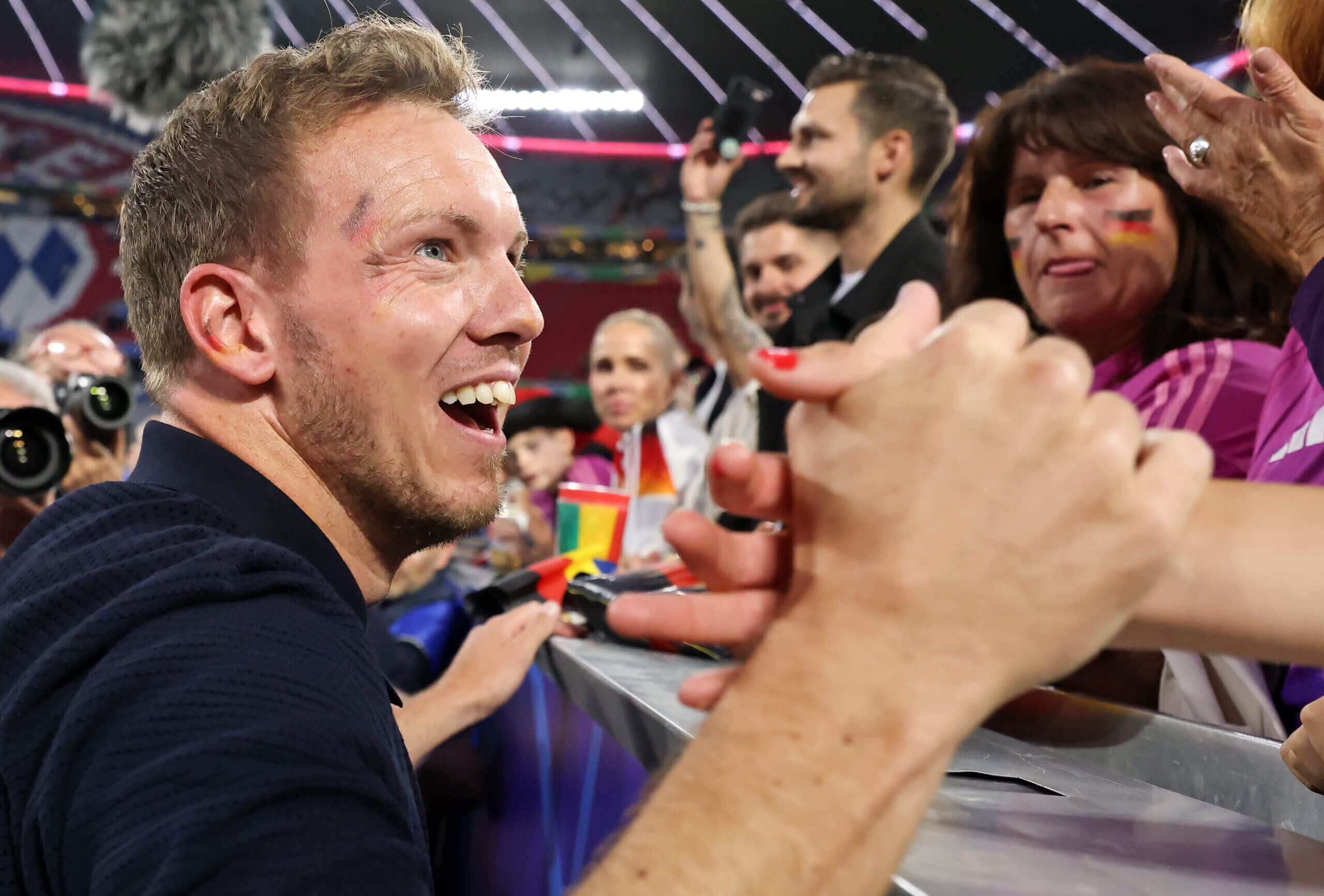
Nagelsmann celebrates Friday’s victory with fans in the stands (Stefan Matzke – sampics/Getty Images)
When that subsided, he spoke of his players’ need to get the public on their side and give them a reason to believe in this Germany.
There are no secrets. Everyone knows people are disenchanted, and have been for some time. The appointment of Nagelsmann, in September 2023, did not immediately change the situation. In fact, his first friendly matches took place without the needle moving much. Defeats against Austria and Turkey in November had no positive effect on the local mood and it was only victories against France and the Netherlands in March that encouraged the Germans to grant more attention to the team and start looking forward to their last European Championship at home.
Enthusiasm is growing. The banners went up, the usual merchandising was sold in all the right places and Peter Schilling’s Major Tom – the 1983 hit recently adopted by German fans – charmed everyone with its soaring choruses. But it was so fragile.
Nagelsmann knew it. He understood that a poor result against Scotland, or even an uncertain performance, would allow pent-up discontent to spill over. When describing the pressure placed on coaches, it is far too easy to lapse into clichés about the hopes of a nation or the world watching us. But the responsibility on Nagelsmann’s shoulders is heavier than many probably realize.
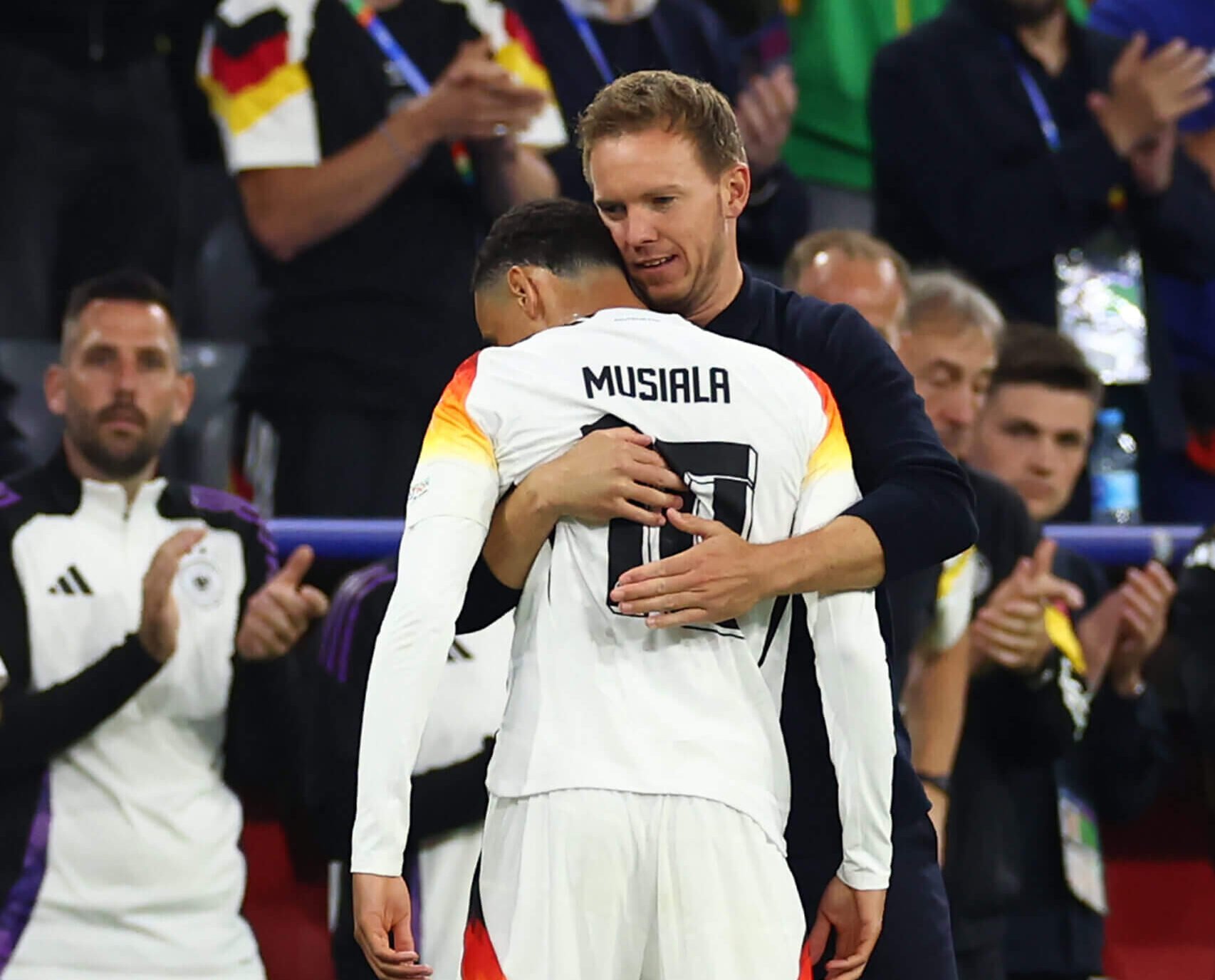
Nagelsmann and Musiala’s embrace says it all (Chris Brunskill/Fantasista/Getty Images)
There was a time when, on the opening night of the tournament, you might have expected the Germans to outscore a Scottish team. They began the 2010 and 2014 World Cups with 4-0 victories, against Australia and Portugal, playing third-rate football en route to a result they knew they would get.
Friday night was different. There was urgency and uncertainty in the air, and the responses to the goals betrayed it. Look at the crazy eyes and body language: this was Germany under pressure.
Jamal Musiala played brilliantly, mesmerizing the Scottish defenders and scoring what, when the champions lift the trophy on July 14, could yet be one of the finest goals of the tournament. But when the 21-year-old was substituted in the 74th minute, he nearly fell into Nagelsmann’s arms, clinging to his arms long after Thomas Muller had taken his place on the pitch.
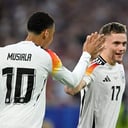
GO FURTHER
The Briefing: Germany 5 Scotland 1 – Germany’s new era, Scotland’s nightmare and why is Kroos retiring?
The victory against Scotland was full of individual achievements and highlights that will remain etched in the minds of those who saw them. Scotland were not the strongest and were reduced to 10 players just before half-time, but fundamentally it was the best German performance in years and the strongest endorsement of Nagelsmann’s tenure.
A magical performance by Musiala :magic_wand::de:@Vivo_GLOBAL | #EUROPOTM pic.twitter.com/spbLGVwHJ3
– UEFA EURO 2024 (@EURO2024) June 14, 2024
When Nagelsmann walked into his post-match press conference, his attitude changed from the day before. He came in with a lighter step, spoke calmly of “good starts” and “next steps” and praised almost all of his players. It was a long exhale of relief after two hours during which the country rejoiced but also — finally — relaxed.
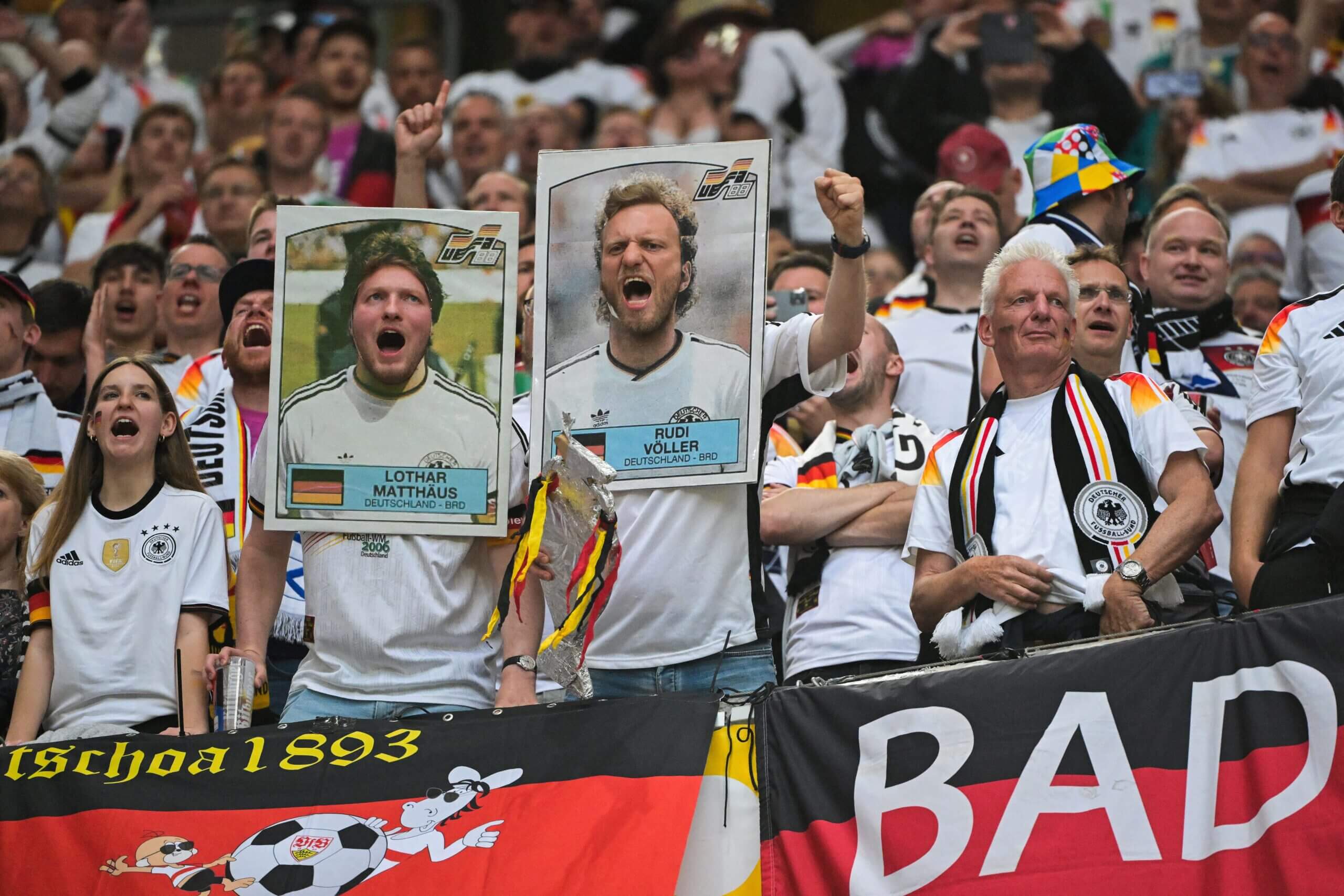
German fans react during Friday’s match against Scotland (Damien Meyer/AFP via Getty Images)
Over the next few days, there will be a rush to announce the start of a second “sommermarchen”, a new summer fairy tale.
In England terms, the 2006 World Cup played here occupies a quality very close to that of Euro 96 in Germany, and many people yearn for the warm glow of national pride associated with that tournament, where, as in 1996 , the hosts reached the semi-final. the finale was then lost in heartbreaking, late fashion. This eagerness sometimes feels like desperation, the hope being that by talking about 2006 enough and forcing it into the conversation, the vibe of 18 years ago will resurface.
Nagelsmann was asked about this on Friday evening.
“Is it going to be another 2006?” Are Florian Wirtz and Jamal Musiala the new Bastian Schweinsteiger and Lukas Podolski?
Sometimes it’s like asking permission to be nostalgic. But it shows that Germany is going through strange times.
Even for those who have only been in the country for a few days during these Euros, it is clearly a changed place. Visitors were dismayed by the unreliability of Deutsche Bahn, the state-funded rail network. It has been plagued by delays and disruptions for years, and its decline, in the abstract, probably represents an erosion of a national principle.
Ideologically, Germany is grappling with difficult and contentious discussions over immigration and rearmament. Since Chancellor Olaf Scholz delivered his Zeitenwende (watershed) speech in February 2022, which heralded the most radical foreign policy change since the end of World War II, the issue of military spending has become an increasingly hot topic. most important.
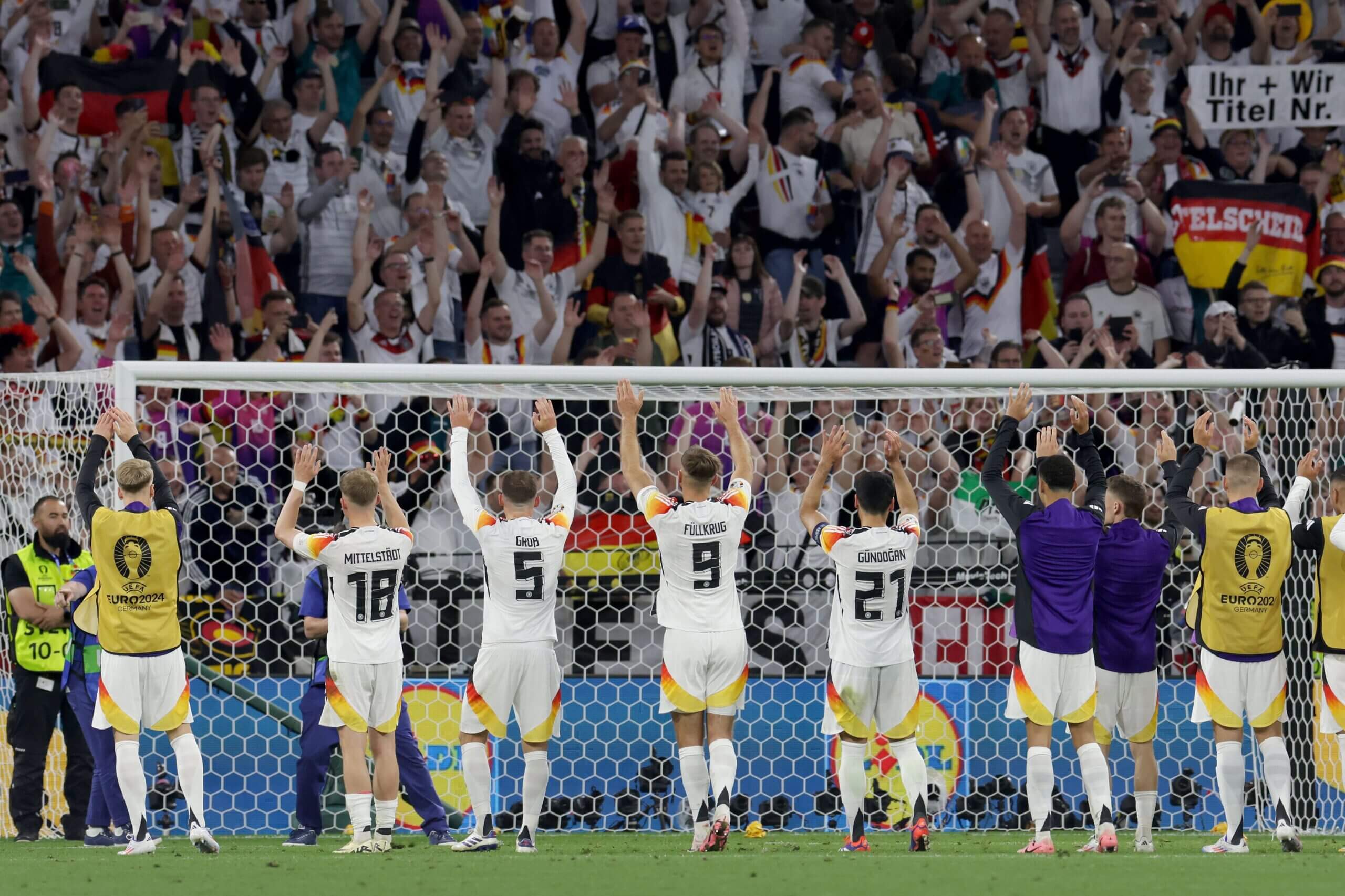
Germany’s players enjoy a moment with their supporters after Friday’s victory (Inaki Esnaola/Getty Images)
Rheinmetall, an arms manufacturer, recently became one of the main sponsors of Borussia Dortmund. Last week, Bundeswehr Tag (Armed Forces Day) was celebrated in cities across the country. Flyers promoting it can still be found at bus stops and train stations, and plastered on city walls.
In the recent European elections, lowering the voting age to 16 did not produce the expected increase in support for the Greens, but rather a surprising 11 point gain for the AfD (Alternative fur Deutschland) d far right among 16 to 24 year olds. who, according to research, are increasingly concerned about the economy, their future and global conflicts.
Things are changing – no one seems to be sure, but the old assumptions are less certain. Germany feels increasingly divided and politically divided.
It takes a different look at this European Championship and what Germans expect from their football team.
Outwardly, this manifests itself in the clamor of another summer fairy tale. In reality, it’s a desire for distraction, a need for the world to slow down for a few weeks. What could be more comforting and reassuring than Germany winning football matches again?
This appears to be the role Nagelsmann and his players have been placed in.
They got off to an excellent start. They can win hearts and minds and sweep the country off their feet. They can absolutely win this competition, and it would be a wonderful story.
But that would be a different kind of fairy tale.
(Top photo: Chris Brunskill/Fantasista/Getty Images)